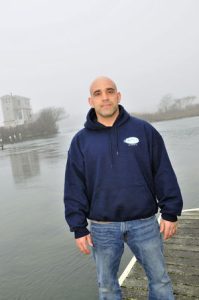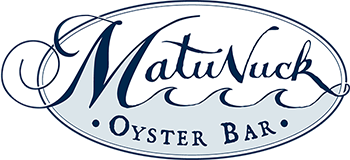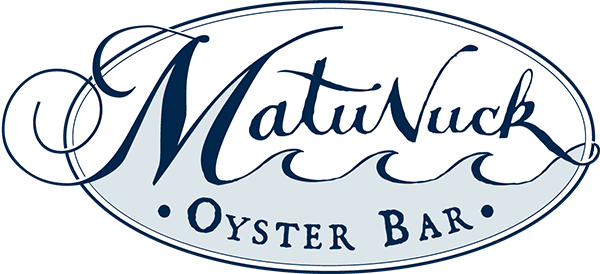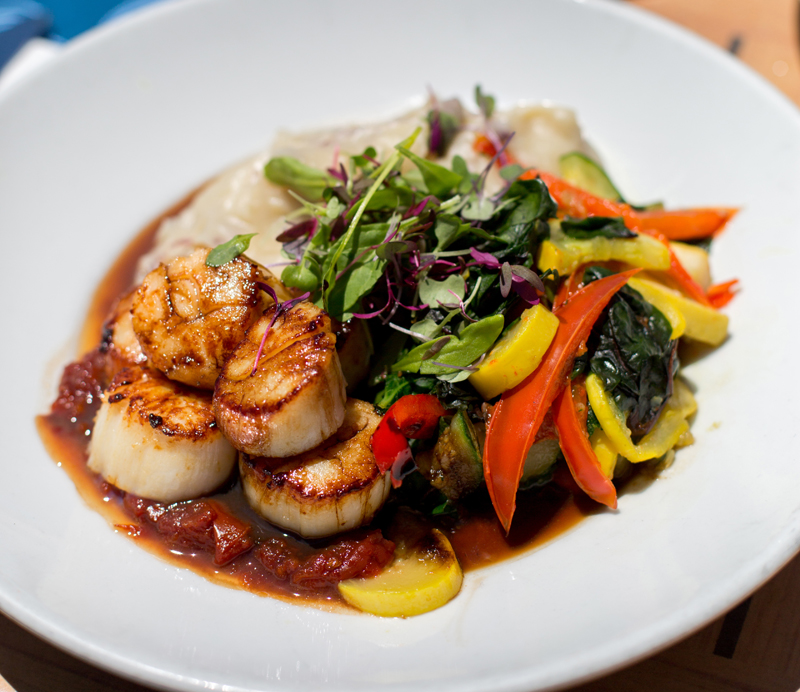Perry Raso, owner of Matunuck Oyster Bar, recently started serving scallops at his restaurant, and will give a TEDxProvidence talk Saturday about his farm-to-table, pond-to-plate practices.
Posted: Thursday, April 7, 2016 11:30 am
As Perry Raso sorts through cages of fresh scallops, he deftly and swiftly finds the larger ones and throws them into a nearby bin, occasionally tossing broken shells off the dock into the salt pond below, and leaving the smaller ones alone so they can continue to grow.
The scallops in the bin are taken into the kitchen of Raso’s Matunuck Oyster Bar, 629 Succotash Road, East Matunuck, where they will be scrubbed and shucked, then served raw or cooked. The scallops, which Raso began growing from seed two years ago, made their debut on the restaurant’s menu March 28.

A proud Facebook post announced the occasion: “We are excited to be the first restaurant ever to serve Rhode Island farm raised bay scallops. Tonight we are serving our first-ever harvest of Matunuck Bay Scallops mariniere style with white wine, garlic and fresh herbs.”

For Raso, who is clearly at ease getting his hands dirty, the addition of pond-raised scallops is an exciting one. It’s been awhile since local scallops were harvested regularly in Rhode Island, and they are his favorite food.
“The best food in the world, to me, is a raw Bay scallop,” he said.
For now, Raso is harvesting 10 cages of scallops, which is nothing in comparison to the thousands of oyster cages he farms, he said. Like the oysters, scallops are an environmentally friendly and sustainable food source.
In the last 15 years, Raso has become an advocate for sustainable shellfish and viable aquaculture, and is now a star is this field – he has been featured on cable food programs, and in a June 2014 National Geographic article “How to Farm a Better Fish,” which covered farmed fish on a global scale. He also will speak at TEDxProvidence Saturday.
“TEDx” is a localized, independent version of the TED Talks and, according to the TEDxProvidence website, “is a program of local, self-organized events that bring people together to share a TED-like experience. Our event is called TEDxProvidence, where x = independently organized TED event. At our TEDxProvidence event, TEDTalks video and live speakers will combine to spark deep discussion and connection in a small group. The TED Conference provides general guidance for the TEDx program, but individual TEDx events, including ours, are self-organized.”
Raso admits he had never heard of TED Talks before receiving an email announcing he had been nominated to participate. He’s given his oyster, shellfish and aquaculture talk dozens of times, he said, but is a bit nervous about the TEDxProvidence talk. His presentation, he said, will most likely merge his personal story into the “broader ideas of how we’re going to meet food production in the next 50 years.”

Speaking about these broader ideas is a byproduct of Raso’s business. He said his reasons for becoming involved in sustainable shellfishing were not romantic. When he was beginning to grow his business, he had no idea of the greater, global food movement.
Raso grew up shellfishing in nearby waters, primarily behind summer cottages in Point Judith. His initial interest was a financial one, he said: “It was the best way I knew to make money when there wasn’t snow on the ground.” He recalls making $40-50 a day, which he said was a lot for a kid in junior high. Digging became diving, and he soon found himself further emerged in the world of shellfishing.
At the time, Raso didn’t think he had a strong connection to the water – digging and diving were simply an effective job. “It was the best way I knew how to make money,” he said.
But he went off to college in Colorado, where he realized his connection to the ocean was greater than he realized. “I realized I do love the ocean,” Raso recalled. After two years, he transferred to the University of Rhode Island, where he studied marine biology. However, it was classes in aquaculture and fisheries that really caught his attention and better suited his skills and interests.
During his undergraduate years, he went on a trip to Cape Verde, an island nation off the coast of West Africa, to further study aquaculture. Not only was this Raso’s first big trip, it also is what hooked him on the idea of using aquaculture farming as a means to provide a population with a protein source in a sustainable way.
“It seemed like fun, and I wanted to do it,” Raso said.
He returned home, finished his undergraduate degree in 2002, and eventually went on to graduate school at URI. In between, he started an education initiative, as well as his own oyster farm. What was a one-acre endeavor in 2002 has since grown to seven acres.
In 2009, he opened the Matunuck Oyster Bar. Raso said he used to drive by the site and think “one day.” When he finally did buy the property, he said he primarily did so because of its commercial docks. He didn’t have restaurant experience, and never expected the restaurant to be open year round. But, he said, summer ended and the restaurant stayed open. He is now known for his service, and the fact he often personally visits tables to ask customers about their meals.
After running the restaurant for three years, Raso wanted to increase the farm-to-table, pond-to-plate appeal and so began an organic farm. The farm is located near his oyster farm, where Captain John Potter – for whom Potter Pond is named – had his vegetable farm in the 1700s.
In addition to shipping his shellfish all over the country and serving it locally, Raso also sells seafood and fresh produce at farmers markets around the state. His employees are at four Saturday markets year-round, and many weekday markets during warmer months.
As his business has grown, his indoor duties take precedence, and he said he doesn’t find himself in the pond as much as he would like.
“I miss it a lot, but the grass is always greener,” he said. “When I was out there every day, it was a lot of work, a lot of physical labor. I miss that.” But, he said, he likes that he is able to sell his shellfish at a market rate, and not just wholesale. And he has been able to do other things, like start the vegetable farm.
He also is able to contribute toward a state-wide restoration project. He gives some of his empty shells to the state Department of Environmental Management, which manages an initiative to put the shells back in the water, sometimes with oyster seeds attached, in an effort to rehabilitate the wild population.
“One of the things that we’re going to need in the next 50 years is that we’re going to have to grow more food than humans have grown in the history of mankind,” Raso said, noting that aquaculture benefits ecosystems and the environment by increasing biodiversity and improving water quality. If the seafood industry were to instead promote non-environmentally friendly practices, it would be shooting itself in the foot, he said.
He especially noted the importance of salt water ponds, like Potter Pond, and said that three-quarters of seafood comes from estuaries, and shellfish help to keep these estuaries alive and viable.
The state has a long history of shellfishing, especially when it comes to wild-caught versus farmed seafood. As someone who started out harvesting in the wild, Raso understands the tension between commercial fishermen and those with farms. He admits to being skeptical and judgmental of oyster farmers when he was younger, but said he now understands the context and complexities of farming.
“I would get so frustrated,” he said of driving by farms on his way to dive for oysters. “I guess I was just jealous, [and I would think] what gives that person the right to own this water body. Little did I know people could still swim and fish there.” Or, he added, that contrary to what he thought, that area had never been populated with shellfish. What he couldn’t tell from the road, he said, was that an oyster farm was in that location because it didn’t compete with oysters being harvested in the wild.
While the culture around shellfishing has evolved in recent years, Raso said farming is not a non-issue. But, he noted, “we all own our estuary,” he said. “Rhode Islanders all own these ponds – [no one has] exclusive rights.
“I had been wild harvesting shellfish in this pond [Potter Pond] for years,” he said. “I know the area where I started my farm was never used by commercial fishermen, so I had that knowledge of the area, which was very helpful.”
As his business and practices have grown, Raso has traveled to Ethiopia, Tanzania, China and Vietnam, where he has met with farmers and fishermen. He said his long-term goal is to help farmers in developing countries maximize their seafood intake in a sustainable way – both in terms of the environment, and in feeding populations.
In the meantime, he will continue to be a local superstar, even if being in the spotlight was never his ambition; Raso has a lot to say on the subject of sustainable seafood, and people near and far are listening.
“Farmed shellfish is definitely a sustainable seafood, and we’re excited about it,” he said.


